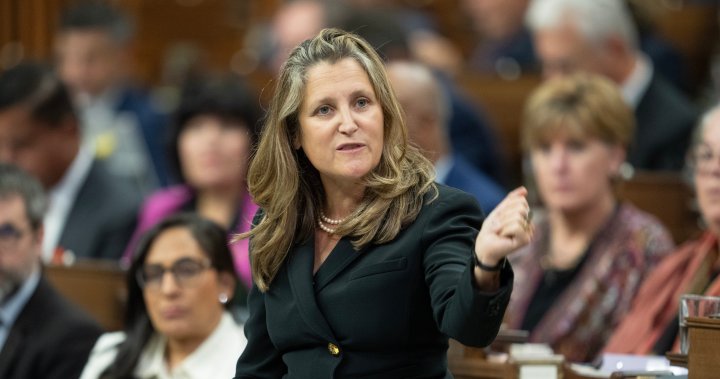Pressure is intensifying on the U.S. Congress to pass additional aid to Ukraine, with senior military leaders in Canada and the U.S. issuing stark warnings this week that Russia will overwhelm the Ukrainians unless ammunition starts flowing to Kyiv soon.
The mounting pressure comes as Ukraine has passed a controversial law to expand military conscription in the country, hours after Russia launched another round of missile strikes on Ukrainian energy facilities overnight Thursday.
“The strikes in Ukraine over the past 24 hours are another terrible reminder that Ukraine’s need is critical,” White House Press Secretary Karine Jean-Pierre said Thursday as she urged the U.S. House of Representatives to hold a vote on whether to approve billions of dollars in new aid.
Yet Canada’s political leaders are continuing to express confidence that U.S. support for Ukraine will ultimately prevail, with Defence Minister Bill Blair calling the legislative logjam in Washington “a bump in the road.”
Asked about that comment moments after he offered it at the Senate national defence committee on Monday, Blair said, “I have been accused of being overly optimistic.”
“But I’ve worked with the Americans for a very long time, and I judge the character of the people I deal with to be strong and resolved, and they are absolutely committed to supporting Ukraine,” he said.
He added he doesn’t know anyone “more committed to the defence of Ukraine” than his U.S. counterpart, Defense Secretary Lloyd Austin.
But Austin isn’t the one holding up the national security supplemental funding bill that would provide roughly US$60 billion in new military and financial aid to Ukraine. Only House Speaker Mike Johnson can bring the legislation to the floor of the House of Representatives, yet he has not done so in the weeks since the Senate passed the bill in February amid division among his Republican members.
A spokesperson for Blair’s office confirmed that the minister has not had any conversations with Johnson or other congressional leaders in the U.S. about Ukraine. The spokesperson added Blair had no plans to hold such conversations “at this time.”

Global News has asked Foreign Affairs Minister Melanie Joly’s office if she has reached out to U.S. lawmakers to press for the aid to be passed. Other pro-Ukraine allies, including British Foreign Minister David Cameron and Polish Prime Minister Donald Tusk have publicly urged Johnson to act, though a planned meeting between Cameron and Johnson last week was scuttled due to scheduling issues.
On Thursday, Japanese Prime Minister Fumio Kishida — whose country has taken a strong role in supporting Ukraine’s defence against Moscow — addressed a joint session of Congress and warned against U.S. isolationism at a time of rising global conflict.
Breaking news from Canada and around the world
sent to your email, as it happens.
He noted in particular that the war Ukraine faces today “may be the East Asia of tomorrow” as China seeks to exert its influence and has threatened that “no force” can keep China and Taiwan from “reunion.”
“As we meet here today, I detect an undercurrent of self-doubt among some Americans about what your role in the world should be,” Kishida told the lawmakers, with Johnson sitting behind him.
“The leadership of the United States, it is indispensable. Without U.S. support, how long before the hopes of Ukraine would collapse under the onslaught from Moscow?”
‘The side that can’t shoot back loses’
The growing political pressure has been matched with dire updates on the war front from military officials, who say Ukraine is running out of ammunition and manpower at a time when Russia is mobilizing its population and ramping up its defence industrial base at a faster rate than previously predicted.
On Wednesday, U.S. Army Gen. Christopher Cavoli — the commander of U.S. European Command who also serves as NATO’s supreme allied commander in Europe — told the U.S. House Armed Services Committee that Ukraine will exhaust its existing artillery and air defence munition stocks “in fairly short order” without continued U.S. support.
Russia, he added, is expected to have a 10-1 advantage on artillery shells “within weeks.”
“Based on my experience in 37-plus years in the U.S. military, if one side can shoot and the other side can’t shoot back, the side that can’t shoot back loses,” he said. “So, the stakes are very high.”
Similarly, Canada’s Chief of the Defence Staff Gen. Wayne Eyre told the same Senate defence committee meeting attended by Blair on Monday that Russia is already outgunning Ukraine at a rate of four to one.
He added the Russians have also shown “a much lower regard for life” by sending waves of expendable soldiers into battle in a tactic the Ukrainians have called “meat storms,” quickly replacing them by recruiting from a far larger population.

Eyre said he believes the situation has devolved into a war of attrition.
“We are also seeing Ukrainian systems being overwhelmed by the sheer quantity of drone and missile attacks from Russia,” he said. “And so the sense of urgency continues to be extremely important.”
Russia has renewed its strikes on Ukrainian energy infrastructure in recent weeks, including a large round of assaults overnight Thursday that destroyed one of Ukraine’s largest power plants and damaged others across the country.
Moscow is believed to be using new tactics and intelligence to execute the strikes with better accuracy than previous energy-targeting campaigns during the more than two-year invasion.
Ukrainian President Volodymyr Zelenskyy has publicly warned that without Congress’s help through the supply of new U.S.-supplied weapons and artillery, Ukraine “will lose the war.”
Johnson said both last month and this week, after the House returned from a two-week recess, that he intends to bring a Ukrainian aid bill to a vote soon. But he’s reportedly struggling to determine how best to do that as he faces the threat of revolt from some Republicans.
Meanwhile, Blair said Monday he has struck an agreement with the Czech Republic to purchase existing ammunition that can be rushed to Kyiv at a cost of $60 million, in lieu of a separate $300-million deal to produce 1.5 million rounds of ammunition in Canada that will take more than two years to deliver on.
“The discussion among myself and all of our other allies other than the United States is that while the Americans are resolving this, the rest of us have to step up and do more,” he said.
— with files from the Associated Press
© 2024 Global News, a division of Corus Entertainment Inc.





